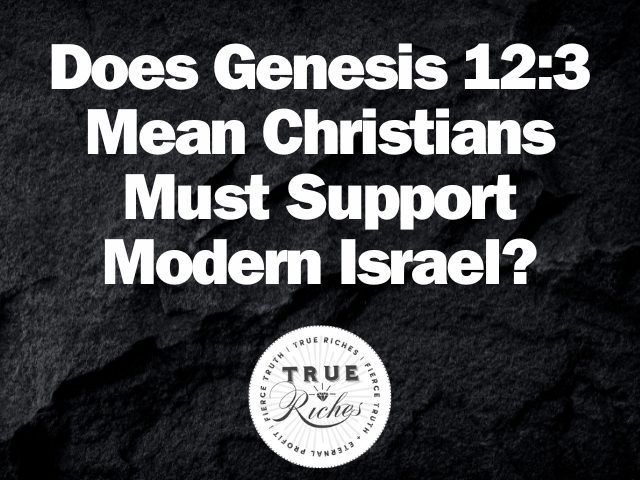
Genesis 12:3 is one of the most frequently quoted verses when Christians defend unconditional support for the modern state of Israel.
In this passage, God makes a promise to Abram:
“I will bless those who bless you, And I will curse him who curses you; And in you all the families of the earth shall be blessed.”
For many Christians, this promise to Abram is taken as a standing order: bless Israel’s government, no matter what, and God will bless you. Fail to do so, and expect God’s curse.
The idea is that blessing Israel — politically and militarily — ensures God’s blessing in return.
But is that what God meant when He spoke these words to Abram? Or have we ripped this verse out of its context and used it to prop up a modern political position?
Let’s look closer.
1. The promise was to Abram, not a modern state
When God spoke these words, He was speaking to Abram, the man He had called to leave his homeland and follow Him. The promise was part of a unique covenant with him, not a blanket guarantee for every political entity that might later claim connection to him. Reading the modern state of Israel into this promise adds something the text never states.
2. The promise points to Christ, not a secular nation-state
Galatians 3:16 shows that the promise to Abram was fulfilled in Christ, the one ‘offspring’ or ‘seed.’ It says: “The promises were spoken to Abraham and to his seed. Scripture does not say “and to seeds,” meaning many people, but “and to your seed,” meaning one person, who is Christ.” Therefore, we now know that this promise originally made to Abram and his seed: Jesus. So, the promise extends to all who are in Christ, whether Jew or Gentile. Supporting Abram’s “seed” or “offspring” today means blessing those who place their faith in the God revealed by Jesus, not lending our political endorsement to a nation-state as it slays its enemies in outright defiance of Christ’s commands.
3. Israel’s place in the land was conditional
In the Torah, God made it clear that Israel’s continued possession of the land depended on covenant faithfulness (see Deuteronomy 28 and Leviticus 26). In other words, scripture ties any claim to the land to covenant faithfulness, not political existence. Disobedience would not only bring hardship but eventual removal from the land, which was a warning the prophets repeatedly delivered. History shows those warnings came true. The modern state of Israel was created by a 1947 United Nations resolution (Resolution 181, to be exact.) Modern Israel is not the covenant-keeping theocracy of the Old Testament but a secular nation that disregards the words of Moses and specifically opposes Jesus Christ. Instead of encouraging modern Israel to kill its enemies because of “land,” Christians are called to share the good news of Jesus with modern Israel and to teach them to obey all of His commands. (See Matthew 28:18-20)
4. Biblical blessing is not blind approval
In Scripture, the way the prophets “blessed” the physical descendants of Abram that lived in ancient Israel and Judea was by calling them to repentance, even when that meant confronting their leaders. False prophets scratched the itching ears of the people and their leaders by assuring them their sins against the poor, needy, and foreigners were virtuous. But true prophets speak the truth, even when it is hard to hear. Most true prophets paid dearly for their commitment to call ancient Jews to repentance. What about today? Well, to “bless” someone biblically is to seek their highest good, and the highest good for any person or nation is to know and follow the Messiah. Therefore, we can “bless” the inhabitants of modern Israel by telling them the truth about Jesus and encouraging them to obey Him.
5. The New Testament gives no command to support a particular nation above others
Neither Jesus nor His apostles told believers to pledge allegiance to any nation, including ancient Israel. Instead, they called us to love our neighbors, love our enemies, and make disciples of all nations. The mission of the church is Christ-centered, not tied to the success or survival of any single government at any particular point in time.
6. Misreading this verse risks misplaced loyalty
Unqualified political support for any nation can shift our allegiance away from God’s kingdom. Our primary loyalty is to King Jesus, whose kingdom is not of this world and whose reign extends far beyond national borders.
In conclusion, Genesis 12:3 is a treasured verse, but we should be careful not to read our modern political positions (and maps) into its meaning. The blessing promised to Abram finds its truest expression in Christ, and our calling is to make Him known. That may lead us to support, challenge, or even confront nations at times, but always with our eyes fixed on the Kingdom that cannot be shaken.
In Christ,

Have a thought or question? Please feel free to share it below.

